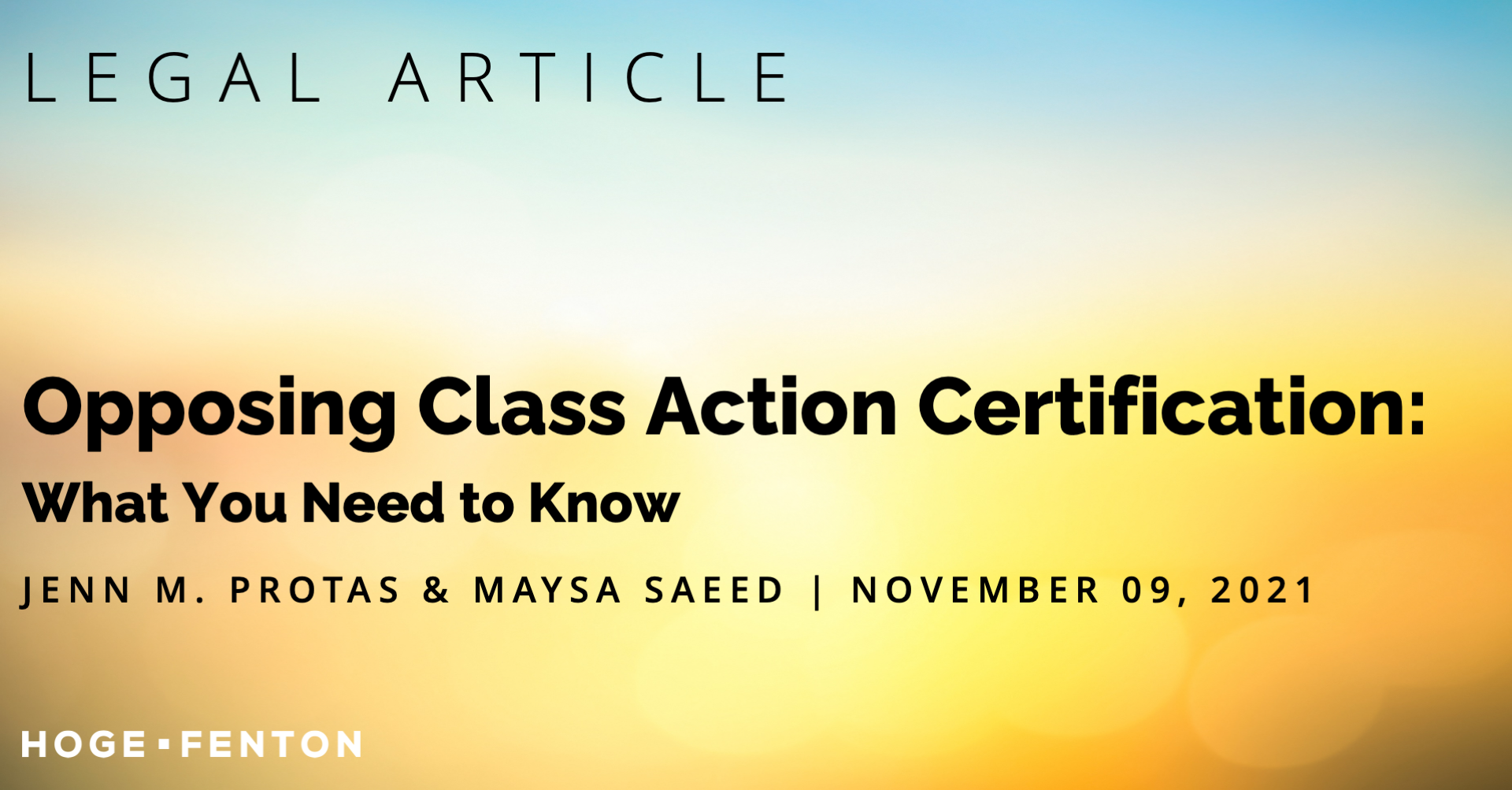Opposing Class Action Certification: What You Need to Know
By Hoge Fenton | 11.9.2021 | Employment Law

Class action lawsuits are on the rise, particularly in the area of employment law. These lawsuits can lead to steep financial liabilities for employers. Employers can limit class actions by asking employees to sign arbitration agreements with class action waivers.
Class action lawsuits are distinct and separate from Private Attorneys General Act (“PAGA”) actions, which are commonly filed with class actions and lead to sometimes crippling penalties. For more information about PAGA, please refer to our articles, So You Were Copied on an LWDA Letter – What Do You Do? and Employers Beware! Wage & Hour Violations Can Lead to Steep Penalties.
What is a Class Action Lawsuit?
Class action lawsuits are intended to resolve similar claims of many individuals at the same time. Class actions are lawsuits in which one or more plaintiffs sue a common defendant and purport to act as representatives of a group of people with common legal interests. The named plaintiffs in a class action are referred to as the “class representatives.” In this context, the word “class” means a specific group of people. Class action lawsuits are common in employment law, particularly where a group of employees allegedly suffered the same wage and hour violations due to an employer’s policy or practice. For example, an employer may be susceptible to wage and hour lawsuits for unpaid overtime, inaccurate wage statements, meal and/or rest break violations, or unpaid business expenses as a result of imprecise, inaccurate, or unenforced timekeeping and payroll practices. In such instances, the courts generally consider a class action to be more efficient than the possibility that each employee might bring their own lawsuits against the employer based on the same set of facts and issues.
Why is Class Certification Important?
Before the merits of the allegations are evaluated, a class action case must undergo what is called “class certification.” At the certification stage, the judge is assessing whether the lawsuit should proceed as a class action. For a class to be certified, the class representatives must file a motion for certification for the court to consider. If the class certification motion is denied, the class action lawsuit cannot move forward. This creates an opportunity for the employer to oppose the class certification and potentially end the class action lawsuit, limiting the class representatives to lawsuits based on their own individual claims only[1].
To certify a class, class representatives must prove three requirements, as identified by the California Supreme Court:
- “the existence of an ascertainable and sufficiently numerous class;”
- “a well-defined community of interest;” and
- “substantial benefits from certification that render proceeding as a class superior to the alternatives.” (Lockheed Martin Corp. v. Superior Court (2003) 29 Cal.4th 1096, 1104.)
First, to establish whether there is an “ascertainable class,” the court examines the definition of the class, the estimated class size, and the methods used to identify class members. In wage and hour class actions, the class is often defined as “non-exempt employees” because most wage and hour laws are applicable to that subset of employees. While there is no set number required to maintain a class action, a court is less likely to certify a class of five individuals versus a class of 100 individuals. That said, case law indicates that classes of 30 – 40 class members satisfies the numerosity requirement, and courts have certified classes as small as 10 class members. (Rose v. City of Hayward (1981) 126 Cal.App.3d 926, 934; Bowles v. Superior Court (1955) 44 Cal.2nd 574.)
Second, the court considers three factors when evaluating whether there is a “well-defined community of interest:”
- Whether there are common questions of law and fact. This means the underlying facts giving rise to the legal issues should be similar amongst the class members. Courts have approved class actions in wage and hour cases when the allegations disclose standardized and uniform wage and hour policies affecting all class members in the same manner;
- The class representatives’ claims cannot significantly differ from the claims of the class members. Generally, if a class representatives’ allegations arise from a similar event, practice, or course of conduct that gives rise to the allegations of the other class members, and the elements of the cause of action are similar, then its considered “typical;” and
- The class representatives and their counsel must be willing and capable of protecting the interests of the class members and of representing the class. Factors courts consider are conflicts of interest and knowledge of the case and duties to represent the class.
Lastly, the class representatives must establish that a class action lawsuit is the better method of handling the case (vs. individual litigation) because it will save time, reduce waste, and limit duplication of effort.
How to Oppose Class Certification
To oppose commonality, numerosity, typicality, and/or adequacy, employers need to be prepared to produce their payroll and time records and policies during the applicable class period to support their position that a class action is not the appropriate means for resolving the matter. Outside of such documents, witness testimony in the form of written declarations and depositions are also commonly submitted as evidence at this stage. Plaintiffs are generally entitled to some discovery to bring their motion for class certification, including the employer’s pay and time records, and they can depose employees as well as the persons most knowledgeable for the employer. To protect employees’ privacy, the notice procedure commonly referred to as the Belaire-West process is typically implemented to allow current and former employees the opportunity to opt-out of having their names and contact information from being disclosed on the payroll and time records. A third-party vendor generally handles the notice distribution and collection process. As you can imagine, the entire certification process can be tedious and time consuming, which makes it a costly endeavor. As such, employers should ensure they have compliant payroll and time records and policies in place and readily accessible as they are key components to the certification process.
What Happens After a Class Is Certified?
Once a class is certified, the merits of the class claims are evaluated and prosecuted through litigation. Class members will be notified of the class action via a legal notice that explains what the class action is about and the class members’ rights. Class members have the right to “opt out” of class actions or proposed settlements in class actions that are filed in California state court. A class member who chooses to opt out retains their right to file an individual lawsuit. A class member who does nothing is bound by any approved settlement or judgment in the class action. The parties are free to engage in alternative dispute resolution at any point—pre- or post- certification. If the parties agree to a proposed settlement, the court must approve the settlement to ensure the interests of the class are fairly adjudicated.
Takeaways
Because wage and hour class actions are very common, it is imperative for employers to regularly audit their payroll and timekeeping records, practices, and policies to ensure they comply with applicable law. Failure to do so can result in a class action lawsuit that is costly to litigate and resolve. Consult with employment counsel if you have questions or concerns regarding your payroll, timekeeping, or other business practices that may be susceptible to wage and hour non-compliance.
Hoge Fenton’s Employment Law Group has significant experience defending employers in class action lawsuits throughout California. For more information and to contact Hoge Fenton’s Employment Law Group, please visit:
https://www.hogefenton.com/practices/employment-law/
[1] Whether a class action is certified does not necessarily impact whether an employee is permitted to maintain a PAGA lawsuit on behalf of all aggrieved employees.
Our Employment Law Group
 |
Sarju A. Naran (he/him) is a zealous advocate for his clients and approaches litigation with creativity and strategy. Chair of Hoge Fenton’s Employment Law Group, Sarju’s experience spans from representing middle-market and family-owned closely held businesses to large multi-national companies. He regularly litigates and provides advice and counsel to companies on wage and hour issues, trade secret misappropriation, employee mobility, wrongful termination, performance management, and leaves of absence. |
 |
Jenn M. Protas (she/her) helps employers navigate California’s numerous employment laws and defends employers with an eye toward successful, yet cost-effective resolution. Jenn is a committed advocate for her clients and a tenacious litigator. She defends employers on matters related to wage and hour law, wrongful termination, harassment, discrimination, and retaliation in single-plaintiff litigation, Private Attorney General Act actions, and/or class actions. Jenn’s practice also includes housing discrimination matters and business litigation. |
 |
Maysa Saeed (she/her) is an associate attorney whose practice focuses on employment counseling and litigation and assists clients in all aspects of employment law. Prior to joining Hoge Fenton, Maysa was a litigation associate with experience litigating various commercial, employment, and real estate matters. Maysa’s prior legal experience also includes defending insurance carriers in administrative trials before the Workers’ Compensation Appeals Boards in San Jose and Salinas. |
This information is provided as an educational service by Hoge Fenton for clients and friends of the firm. This communique is an overview only, and should not be construed as legal advice or advice to take any specific action. Please be sure to consult a knowledgeable professional for assistance with your particular legal issue. © 2021 Hoge Fenton










